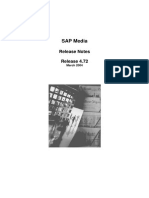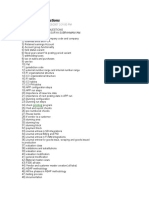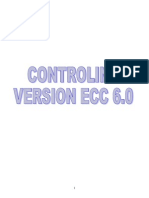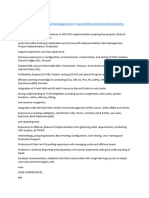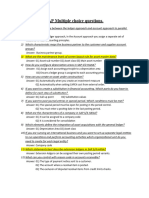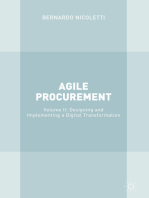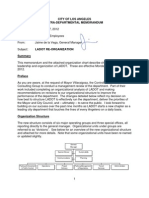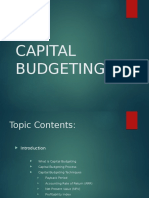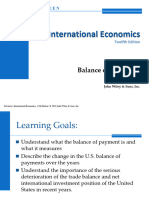0 ratings0% found this document useful (0 votes)
49 viewsSAP FICO Interview Questions
SAP FICO Interview Questions
Uploaded by
cnpradeep2717This document lists over 100 questions related to SAP FICO configuration and processes. It covers topics such as organizational structures, account groups, number ranges, master data, reporting, costing, integration with other modules like SD and MM, closing processes, and more. Understanding the concepts and configuration steps for these areas would help prepare for an interview on SAP FICO.
Copyright:
Attribution Non-Commercial (BY-NC)
Available Formats
Download as DOC, PDF, TXT or read online from Scribd
SAP FICO Interview Questions
SAP FICO Interview Questions
Uploaded by
cnpradeep27170 ratings0% found this document useful (0 votes)
49 views4 pagesThis document lists over 100 questions related to SAP FICO configuration and processes. It covers topics such as organizational structures, account groups, number ranges, master data, reporting, costing, integration with other modules like SD and MM, closing processes, and more. Understanding the concepts and configuration steps for these areas would help prepare for an interview on SAP FICO.
Original Title
Doc
Copyright
© Attribution Non-Commercial (BY-NC)
Available Formats
DOC, PDF, TXT or read online from Scribd
Share this document
Did you find this document useful?
Is this content inappropriate?
This document lists over 100 questions related to SAP FICO configuration and processes. It covers topics such as organizational structures, account groups, number ranges, master data, reporting, costing, integration with other modules like SD and MM, closing processes, and more. Understanding the concepts and configuration steps for these areas would help prepare for an interview on SAP FICO.
Copyright:
Attribution Non-Commercial (BY-NC)
Available Formats
Download as DOC, PDF, TXT or read online from Scribd
Download as doc, pdf, or txt
0 ratings0% found this document useful (0 votes)
49 views4 pagesSAP FICO Interview Questions
SAP FICO Interview Questions
Uploaded by
cnpradeep2717This document lists over 100 questions related to SAP FICO configuration and processes. It covers topics such as organizational structures, account groups, number ranges, master data, reporting, costing, integration with other modules like SD and MM, closing processes, and more. Understanding the concepts and configuration steps for these areas would help prepare for an interview on SAP FICO.
Copyright:
Attribution Non-Commercial (BY-NC)
Available Formats
Download as DOC, PDF, TXT or read online from Scribd
Download as doc, pdf, or txt
You are on page 1of 4
SAP FICO Interview Questions
1) Differences between company code and company
2) business area and PCA
3) Retained earnings Account
4) Account group functionality
5) field status variant
6) fiscal year variant Vs posting period variant
7) withholding taxes
8) tax on sales and purchases
9) use tax
10) Vat
11) jurisdiction code
12) external number range and internal number range
13) FI organizational structure
14) CO organizational structure
15) FI tables
16) CO tables
17) CO-PA tables
18) APP configuration steps
19) APP run steps
20) Importance of base line date
21) importance of next posting date in APP run
22) Dunning configuration
23) Dunning run steps
24) check printing program
25) Void and reprint checks
26) pre numbered checks
27) House banks
28) if vendor is a customer
29) dunning area
30) dunning key
31) dunning block
32) payment block
33) Journal entries in SD integrations
34) Journal entries Billing and PGI
35) Journal entries in FI-MM integrations
36) Journal entries for goods issue, scraping and goods issued
to production
37) valuation class
38) validations and substitutions
39) valuation area
40) valuation modification
41) general modification
42) Material master views
43) FS00 all tabs
44) Vendor and customer master creation( all tabs)
45) ASAP methodology
46) All five phases in ASAP methodology
47) testing process
48) documentation
49) functional specs
50) user exits
51) customer exits
52) enhancements
53) tables view
54) work bench request and customizing requests
55) SM35 and SE38 screens
56) DEV, testing and PRD clients
57) Tickets / messages
58) problems faced in implementation and support
59) client, cross client, transport of configuration
60) LSMW
61) BDC
62) Debugging a program
63) Special GL accounts, Special GL Transactions, Alternative GL
accounts
64) Down payment Request, Down payments,
65) Noted items
66) Parking a document and holding a document
67) sample document and recurring document
68) BRS
69) Clearing accounts
70) Open item management
71) line item display
72) bank sub accounts
73) payment terms
74) controlling area
75) versions
76) link between FI and CO
77) assessment and distributions
78) allocation structure
79) what is cost center
80) what is a profit center
81) Profit center configuration steps
82) Report painter
83) Report
84) Report groups
85) Report library
86) Statistical and Real postings
87) Standard hierarchy and alternative hierarchy
88) Transferring data to SD to COPA configurations
89) CO-PA configuration all steps
90) Month end closing
91) year end closing
92) Go-Live activities
93) Lock Box concept
94) cross company code transactions
95) settlements in co
96) difference between cost centers and internal orders
97) Reconciliation Accounts
98) Extended With Holding Taxes configuration steps – right from
creation of WH Tax Types, Codes to Annual Return
99) What is chart of account and how many charts of accounts can
be assigned to a company
100) What is residual payment and part payment
101) procurement cycle in MM
102) goods movement
103) What is GR/IR? What journal entries
104) Primary cost elements and secondary cost elements
105) How to configure FI and CO reconciliation account
106) Steps for electronic bank reconciliation statement
107) CO-PA Transfer of Incoming Sales Orders
108) Report Painter, How to reverse +/- signs
109) What is the relationship between Report Groups and the
report groups
You might also like
- Statements 3750Document6 pagesStatements 3750ytprem agu100% (2)
- RN IS Media 472 ENDocument139 pagesRN IS Media 472 ENakmohantNo ratings yet
- Precision Turned Products World Summary: Market Values & Financials by CountryFrom EverandPrecision Turned Products World Summary: Market Values & Financials by CountryNo ratings yet
- Part 5Document2 pagesPart 5PRETTYKO0% (1)
- CO Interview QuestionsDocument3 pagesCO Interview QuestionsAtul BhatnagarNo ratings yet
- SAP FICO Interview QuestionsDocument4 pagesSAP FICO Interview QuestionsDeb Prasad PatroNo ratings yet
- SAP FICO Interview QuestionsDocument6 pagesSAP FICO Interview Questionskamal rajNo ratings yet
- Sap QuestionsDocument17 pagesSap QuestionsAtul WalvekarNo ratings yet
- Sap Fico Hana New SyllabusDocument8 pagesSap Fico Hana New SyllabusGaurav SelokarNo ratings yet
- Fusion Procurement AgendaDocument2 pagesFusion Procurement AgendaTexas School Of Mental Health USANo ratings yet
- Seqquence To Be Followed 1 Organization Structure 2 Master Data 3 Module Specific 4 5 6 7 8Document27 pagesSeqquence To Be Followed 1 Organization Structure 2 Master Data 3 Module Specific 4 5 6 7 8Bhattahcarjee RupakNo ratings yet
- Road Map of FI/CO: Financial Accounting Enterprises StructureDocument5 pagesRoad Map of FI/CO: Financial Accounting Enterprises StructurePankaj SharmaNo ratings yet
- SAP FICO - Basic and Advance PDFDocument23 pagesSAP FICO - Basic and Advance PDFjmogal01No ratings yet
- IMAN SAP FICO Configuration SummaryDocument2 pagesIMAN SAP FICO Configuration SummaryMahmoud HabeebNo ratings yet
- Fico Intervew QuestionsDocument15 pagesFico Intervew Questionsjitinmangla970No ratings yet
- FI Interview QuestionsDocument6 pagesFI Interview QuestionsJaspal KumarNo ratings yet
- SAP Release 5.00 ECC (The Latest in SAP Software)Document7 pagesSAP Release 5.00 ECC (The Latest in SAP Software)Shams HossainNo ratings yet
- SAP FICO Training Content by Mr. Upendar Reddy, ICWAIDocument4 pagesSAP FICO Training Content by Mr. Upendar Reddy, ICWAIupendarhere0% (1)
- SAP FICO Interview Q&ADocument44 pagesSAP FICO Interview Q&Amm1979No ratings yet
- Best Fico Training in HyderabadDocument8 pagesBest Fico Training in HyderabadAnanthakumar ANo ratings yet
- SAP SD Interview Questions and AnswersDocument4 pagesSAP SD Interview Questions and AnswersPallavi SolaseNo ratings yet
- WIP Configuration SettingsDocument6 pagesWIP Configuration SettingsSantosh Vaishya75% (4)
- SAP FICO End User QueDocument13 pagesSAP FICO End User QueAbhi akhadeNo ratings yet
- Methodex - Sap FicoDocument4 pagesMethodex - Sap Ficon_ashok_2020No ratings yet
- SAP Question BankDocument33 pagesSAP Question Bankpunithan81No ratings yet
- Top 20 SAP SD Interview Questions & Answers (2022 Update)Document14 pagesTop 20 SAP SD Interview Questions & Answers (2022 Update)saurabhkothawade144No ratings yet
- Sample Question SAP Certificate FIDocument54 pagesSample Question SAP Certificate FILaurens VerelstNo ratings yet
- SAPDocument313 pagesSAPG Gopala Krishna Gudladona100% (1)
- Sap SapDocument313 pagesSap SapVenu Undavilli75% (4)
- Top 26 SAP PP Interview QuestionsDocument6 pagesTop 26 SAP PP Interview QuestionsPawan KumarNo ratings yet
- Sap FicoDocument6 pagesSap FicoBharat Sahni100% (1)
- SAP Business One Form Types and Object Types - Geri Grenacher 2Document17 pagesSAP Business One Form Types and Object Types - Geri Grenacher 2shmilyouNo ratings yet
- T-Codes in Sap SDDocument11 pagesT-Codes in Sap SDShaik RasoolNo ratings yet
- Ax Table InfoDocument114 pagesAx Table InfoRaja RavitejaNo ratings yet
- Fi NotesDocument6 pagesFi NotesAbhilash Reddy PNo ratings yet
- General Ledger Accounting:: SAP FICO Course ContentDocument10 pagesGeneral Ledger Accounting:: SAP FICO Course ContentsrinivasNo ratings yet
- SAP FI Certification Sample Questions and Answers DumpDocument20 pagesSAP FI Certification Sample Questions and Answers Dumpsujalsuhaas2007100% (1)
- SAP - FICO ContentDocument7 pagesSAP - FICO ContentthoopuNo ratings yet
- SAP SD Course Content PDFDocument4 pagesSAP SD Course Content PDFshuku03No ratings yet
- Tfin50 1 QuestionsDocument8 pagesTfin50 1 Questionsnvsk_501886805No ratings yet
- OTC Project Corporate ITS MeetingDocument27 pagesOTC Project Corporate ITS MeetingrajinusaNo ratings yet
- SAP - FICO Course ContentDocument10 pagesSAP - FICO Course Contentchaitanya vutukuriNo ratings yet
- SyllabusDocument7 pagesSyllabuschirag jainNo ratings yet
- Ans 2Document3 pagesAns 2Anonymous 9Y6CASD84DNo ratings yet
- INTERVIEW QUESTIONS For FiDocument9 pagesINTERVIEW QUESTIONS For FiSpandana SatyaNo ratings yet
- 70355010Document5 pages70355010Rian FernandiNo ratings yet
- Top 50 SAP FICO Interview Questions & Answers in 2022Document12 pagesTop 50 SAP FICO Interview Questions & Answers in 2022Gisele Hemmel GentilNo ratings yet
- Sap Fico SyllabusDocument7 pagesSap Fico SyllabusUsa IifcaNo ratings yet
- Summary of Modules in SAP Technical ModulesDocument13 pagesSummary of Modules in SAP Technical ModulesnnauthooNo ratings yet
- Top 50 SAP FICO Interview QuestionsDocument10 pagesTop 50 SAP FICO Interview QuestionsSAMARTH NEMANo ratings yet
- Sap Fico Online/classroom/fast Track Training at Saraswat Software SolutionsDocument5 pagesSap Fico Online/classroom/fast Track Training at Saraswat Software SolutionsKirankumar KallemNo ratings yet
- Uzodinma Ucheoma SAP ConsultantDocument8 pagesUzodinma Ucheoma SAP ConsultantZaid ShahNo ratings yet
- Dokumentasi 3 - Config Submodule General Ledger AccountingDocument182 pagesDokumentasi 3 - Config Submodule General Ledger AccountingPuspaOktavianiNo ratings yet
- SAP FI Interview Questions PDFDocument102 pagesSAP FI Interview Questions PDFDeepak SNo ratings yet
- 7-11 Putaway Project Post With Clearing Ap in Sap 4.0B: Functional SpecificationDocument6 pages7-11 Putaway Project Post With Clearing Ap in Sap 4.0B: Functional SpecificationBlahNo ratings yet
- Edited SAP MCQsDocument7 pagesEdited SAP MCQssajidaliraza163No ratings yet
- SAP ECC FI Transaction Codes: Unofficial Certification and Review GuideFrom EverandSAP ECC FI Transaction Codes: Unofficial Certification and Review GuideRating: 5 out of 5 stars5/5 (2)
- The Valuation of Digital Intangibles: Technology, Marketing and InternetFrom EverandThe Valuation of Digital Intangibles: Technology, Marketing and InternetNo ratings yet
- Agile Procurement: Volume II: Designing and Implementing a Digital TransformationFrom EverandAgile Procurement: Volume II: Designing and Implementing a Digital TransformationNo ratings yet
- Microsoft NAV Interview Questions: Unofficial Microsoft Navision Business Solution Certification ReviewFrom EverandMicrosoft NAV Interview Questions: Unofficial Microsoft Navision Business Solution Certification ReviewRating: 1 out of 5 stars1/5 (1)
- Totalizing Fluid Meter & Counting Devices World Summary: Market Values & Financials by CountryFrom EverandTotalizing Fluid Meter & Counting Devices World Summary: Market Values & Financials by CountryNo ratings yet
- Topic 6 - ACCA Cash Flow Q SDocument8 pagesTopic 6 - ACCA Cash Flow Q SGeorge Wang100% (1)
- (PDF Download) Quality Management Reconsidered For The Digital Economy 5th Edition John Beckford Fulll ChapterDocument57 pages(PDF Download) Quality Management Reconsidered For The Digital Economy 5th Edition John Beckford Fulll Chapteradadmoukoc100% (2)
- Report Retail - McKinsey - 2015 - Perspectives On Retail and Consumer GoodsDocument64 pagesReport Retail - McKinsey - 2015 - Perspectives On Retail and Consumer Goodsagudo64No ratings yet
- Berhanu Final 22Document66 pagesBerhanu Final 22MOTINo ratings yet
- Business Studies End Semester NotesDocument45 pagesBusiness Studies End Semester Notesrbkia332No ratings yet
- Forecasting - Module 4 AllDocument22 pagesForecasting - Module 4 AllSandeepPusarapu50% (2)
- Characteristics of Traditional Group InsuranceDocument8 pagesCharacteristics of Traditional Group Insurancechsureshkumar1985No ratings yet
- PARC Relevant Administrative OrdersDocument42 pagesPARC Relevant Administrative OrdersEnrique LibunaoNo ratings yet
- ARCDocument3 pagesARCMuhammad AtifNo ratings yet
- True or FalseDocument5 pagesTrue or FalseMyka Ellah FortalezaNo ratings yet
- CupzzaDocument61 pagesCupzzaChristine FaurilloNo ratings yet
- MATERI - 7 .Manajemen PengadaanDocument33 pagesMATERI - 7 .Manajemen PengadaanyasrannuddinNo ratings yet
- FAQs Comparison of ECC With ICE ConditionsDocument3 pagesFAQs Comparison of ECC With ICE ConditionsHarish Neelakantan100% (1)
- Case 3 Syndicate Group 3 Nike PDFDocument11 pagesCase 3 Syndicate Group 3 Nike PDFMifta ZanariaNo ratings yet
- Ladot Re-Organization Memo (2012!02!17) With Org Chart-1Document6 pagesLadot Re-Organization Memo (2012!02!17) With Org Chart-1Damien NewtonNo ratings yet
- London School of Business and Finance: Leonie Banton A4047120 Supervisor Dr. Andry Rakotovololona Academic Year 2014-2015Document141 pagesLondon School of Business and Finance: Leonie Banton A4047120 Supervisor Dr. Andry Rakotovololona Academic Year 2014-2015Leonie BantonNo ratings yet
- Analysis (DFD, Erd Digrams)Document5 pagesAnalysis (DFD, Erd Digrams)AyushNo ratings yet
- Capital Budgeting Lesson NewDocument44 pagesCapital Budgeting Lesson NewLea MachadoNo ratings yet
- SAP MM Overview For TechnicalDocument27 pagesSAP MM Overview For Technicalbakkali_bilalNo ratings yet
- Kellogg S Supply ChainDocument6 pagesKellogg S Supply ChainSharvari PatilNo ratings yet
- Begreen RFP For Business Plan and Pitch Video ReviewDocument9 pagesBegreen RFP For Business Plan and Pitch Video Reviewhenryobi426No ratings yet
- Organisational Behaviour 3000 Words Jubayer - EditedDocument9 pagesOrganisational Behaviour 3000 Words Jubayer - Editedziniaafrin1988No ratings yet
- User Depot ModuleDocument142 pagesUser Depot ModuleK TULASEERAMNo ratings yet
- Item Info - Multiple Items !!!MAX 50 ITEMS!!!Document4 pagesItem Info - Multiple Items !!!MAX 50 ITEMS!!!evillalbalolNo ratings yet
- D - Salvatore Ch13 UneditedDocument49 pagesD - Salvatore Ch13 UneditedLihle SetiNo ratings yet
- R M ProjectDocument29 pagesR M ProjectVikas JainNo ratings yet
- Ncert Solutions For Class 9 Geography PDFDocument5 pagesNcert Solutions For Class 9 Geography PDFMuskan BatraNo ratings yet
- Richard Marens Returning To Rawls Social Contracting, Social Justice, and Transcending The LimitaDocument14 pagesRichard Marens Returning To Rawls Social Contracting, Social Justice, and Transcending The LimitaKostas BizasNo ratings yet


